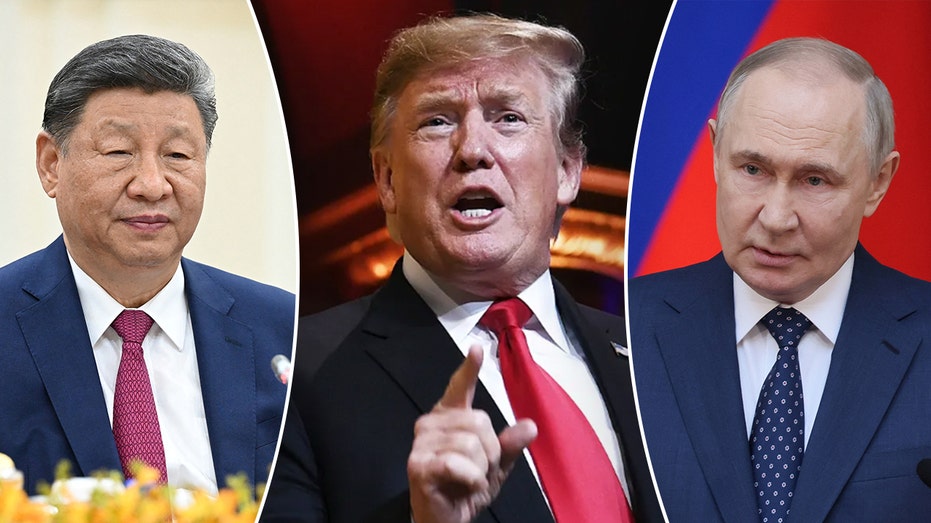Related News
How Trump could ‘un-unite’ the Xi-Putin alliance
Posted by - Senbookpro KAAYXOL -
on - 2 hours ago -
Filed in - Society -
-
8 Views - 0 Comments - 0 Likes - 0 Reviews

President Donald Trump said on the campaign trail he wanted to "un-unite" the alliance between Russian President Vladimir Putin and Chinese President Xi Jinping.
But the immensely complex geopolitical dynamic has prompted questions about whether Trump can pull a "reverse Kissinger" and prompt a modern-day version of the Sino-Soviet split.
"I think there's many ways this alliance could be fractured," Fred Fleitz, who served as a deputy assistant to Trump and chief of staff of the National Security Council during the president’s first term, told Fox News Digital.
TRUMP ISSUES FIRM 10-DAY DEADLINE TO PUTIN TO END WAR
Fleitz pointed to the recent talks between Treasury Secretary Scott Bessent and his Chinese counterparts in Stockholm and said that pushing China to stop purchasing Russian oil or face tariffs was one route that could be effective in trying to drive a wedge.
But Chinese officials have doubled down in their support for Moscow, and in a July meeting with Chinese Foreign Minister Wany Yi and EU diplomatic chief Kaja Kallas, Fox News Digital confirmed that the Chinese official made clear it is not in China’s interest to see Russia lose the war.
The Chinese embassy did not respond to Fox News Digital’s questions regarding what Beijing would consider a "loss" for Russia or why it is in China’s interest to see Russia win in its illegal invasion of Ukraine.
But reports have suggested that China fears Russia losing the war or, at minimum, a cessation of hostilities would free up the U.S. and its allies to focus more heavily on China.
Fleitz argued the core strategy in breaking up the Putin-Xi alliance, which the two have publicly vowed is rock solid, should not focus on attempting to push China away from Russia.
"The Russians and Chinese do not like each other," Fleitz argued, pointing to a 2023 move by China’s Ministry of Natural Resources when it called for historical Chinese names to be included next to the current Russian names on maps depicting its eastern border areas. "The Chinese actually have changed their maps in the Far East to add Chinese names to Russian cities because someday, I think, China is giving the message they're going to take back Russian territories in the Far East.
"We need to make this point to Putin. He has a far better future for Russia, reintegrating into the West and Europe as a state in good standing rather than falling into the arms of the Chinese, who do not have the best interests of Russia at heart," Fleitz, who serves as vice chair of the America First Policy Institute's Center for American Security, said.
EU DEFENSE CHIEF WARNS OF 'MOST DANGEROUS MOMENT' – COORDINATED RUSSIAN-CHINESE AGGRESSION BY 2027
The theory that cozying up to Putin could be the ticket in breaking up his alliance with Xi has been dubbed the "reverse Kissinger" in a nod to Henry Kissinger who, starting in 1972 alongside President Richard Nixon, improved relations with China in a move to further isolate the USSR.
Trump, to some extent, has already tried this approach, as witnessed by his insistence that diplomacy was the best way forward with Putin, his initial reproach of Ukrainian President Volodymyr Zelenskyy as "ungrateful" and his apparent understanding of why Putin invaded Ukraine when it came to supposed threats posed by NATO.
Putin’s war aims have thus far been undeterred and China, which for years took a publicly neutral position when it came to the war in Ukraine, has increasingly voiced its support of Russia despite Western pressure.
But Fleitz argued this strategy will take time.
"It's going to be hard," he said. "But, first of all, our policy with Russia started off in a bad situation for Trump.
"There was no dialog between Putin and Biden after Russia invaded Ukraine," Fleitz added, noting that despite surface-level commentary, strife between Russia and China is brewing.
CLICK HERE TO GET THE FOX NEWS APP
Reports in June leaked by the Russian intelligence agency known as the FSB apparently showed that Moscow has dubbed Beijing "the enemy" and is aware of its efforts to gain access to top military technologies by recruiting Russian spies, often disillusioned Russian scientists.
While reporting has suggested that Russia views China as a strategic partner to counter the West, Beijing is known for playing the long game, and Moscow’s dependence on the Chinese Communist Party as one of its few allies could prove a future vulnerability for it.
"There are press articles coming out lately about how China is spying on Russia and taking advantage of this relationship to advance Chinese security," Fleitz said. "We need to make this point to the Russians at every opportunity — the Chinese are not your friend.
"You need to make a deal with Donald Trump."







